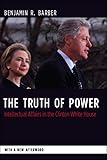The Truth of Power : Intellectual Affairs in the Clinton White House / Benjamin Barber.
Material type: TextSeries: Columbia Studies in Political Thought / Political HistoryPublisher: New York, NY : Columbia University Press, [2008]Copyright date: ©2008Description: 1 online resource (336 p.)Content type:
TextSeries: Columbia Studies in Political Thought / Political HistoryPublisher: New York, NY : Columbia University Press, [2008]Copyright date: ©2008Description: 1 online resource (336 p.)Content type: - 9780231144391
- 9780231534864
- Executive power -- United States -- Case studies
- Intellectuals -- United States -- History -- 20th century
- Intellectuals -- United States -- History -- 20th century
- Presidents -- Intellectual life
- Presidents -- United States -- Biography
- Presidents -- United States -- Intellectual life
- Presidents -- United States -- Intellectual life
- HISTORY / United States / 20th Century
- 973.929092 22
- E886.2 .B37 2008
- online - DeGruyter
- Issued also in print.
| Item type | Current library | Call number | URL | Status | Notes | Barcode | |
|---|---|---|---|---|---|---|---|
 eBook
eBook
|
Biblioteca "Angelicum" Pont. Univ. S.Tommaso d'Aquino Nuvola online | online - DeGruyter (Browse shelf(Opens below)) | Online access | Not for loan (Accesso limitato) | Accesso per gli utenti autorizzati / Access for authorized users | (dgr)9780231534864 |
Frontmatter -- Contents -- Acknowledgments -- PREFACE -- 1. The Road to Camp David -- 2. Don't Stop Thinking about Tomorrow -- 3. Arguments at Laurel Lodge -- 4. The Art of Speechwriting -- 5. A Blizzard in D.C. -- 6. The Community Service President -- 7. Chairman of the NEH (Not!) -- 8. Hollywood East-A Dinner at the White House -- 9. A Guest from the Harding Era -- 10. Clinton vs. Jihad vs. McWorld -- 11. Hillary Takes Over -- 12. The End of the Affair and the Legacy Question -- AFTERWORD: Clinton Recidivus -- INDEX
restricted access online access with authorization star
http://purl.org/coar/access_right/c_16ec
In 1994 Benjamin R. Barber was invited by President Clinton to participate in a seminar on the future of democratic ideas and ideals. Following their meeting, Barber became an informal consultant to the Clinton White House, working with a president who proved to be an astonishing listener open to a variety of ideas. Barber's experiences were unexpected and enlightening-the most unpredictable being his interactions with the president himself.Barber's meditation on Bill Clinton's tenure in office offers a balanced and complex portrait of the Clinton administration, especially in its relationship to America's intellectual and scholarly community. Barber also identifies the true faultlines of power that future candidates must negotiate if they are to win an election. For this edition, Barber has written a new afterword reflecting on Clinton's "vision" problem, his controversial role in shaping today's Democratic Party, and his efforts to confront the challenges of interdependence and terrorism. He concludes with a provocative assessment of Hillary Clinton as a Democratic primary candidate in the battle for the presidency.
Issued also in print.
Mode of access: Internet via World Wide Web.
In English.
Description based on online resource; title from PDF title page (publisher's Web site, viewed 02. Mrz 2022)


